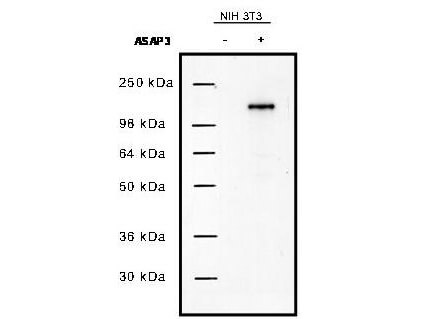Anti-UPLC1/ASAP3 (RABBIT) Antibody
UPLC1/ASAP3 Antibody
- SPECIFICATION
- CITATIONS
- PROTOCOLS
- BACKGROUND

| Host | Rabbit |
|---|---|
| Conjugate | Unconjugated |
| Target Species | Human |
| Reactivity | Human |
| Clonality | Polyclonal |
Application
| WB, E, I, LCI |
| Application Note | This protein A purified antibody has been tested for use in ELISA and western blotting. Specific conditions for reactivity should be optimized by the end user. Expect a band approximately 100 kDa in size corresponding to UPLC1/ASAP3 protein by western blotting in the appropriate cell lysate or extract. |
| Physical State | Liquid (sterile filtered) |
| Buffer | 0.02 M Potassium Phosphate, 0.15 M Sodium Chloride, pH 7.2 |
| Immunogen | This antibody was prepared from whole rabbit serum produced by repeated immunizations with recombinant human UPLC1/ASAP3 protein. |
| Preservative | 0.01% (w/v) Sodium Azide |
| Gene ID | 55616 |
|---|---|
| Other Names | 55616 |
| Purity | This protein A purified antibody is directed against human UPLC1/ASAP3 protein. The product was purified from monospecific antiserum by protein A chromatography. A BLAST analysis was used to suggest cross-reactivity with UPLC1/ASAP3 protein from mouse and rat based on approximately 80% homology with the human protein. Reactivity against homologues from other sources is not known. |
| Storage Condition | Store UPLC1 / ASAP3 Antibody at -20° C prior to opening. Aliquot contents and freeze at -20° C or below for extended storage. Avoid cycles of freezing and thawing. Centrifuge product if not completely clear after standing at room temperature. This product is stable for several weeks at 4° C as an undiluted liquid. Dilute only prior to immediate use. |
| Precautions Note | This product is for research use only and is not intended for therapeutic or diagnostic applications. |
| Name | ASAP3 |
|---|---|
| Synonyms | DDEFL1, UPLC1 |
| Function | Promotes cell proliferation. |
| Cellular Location | Cytoplasm. |
| Tissue Location | Highly expressed in primary hepatocarcinoma. Detected in lung, liver and blood leukocytes |

Thousands of laboratories across the world have published research that depended on the performance of antibodies from Abcepta to advance their research. Check out links to articles that cite our products in major peer-reviewed journals, organized by research category.
info@abcepta.com, and receive a free "I Love Antibodies" mug.
Provided below are standard protocols that you may find useful for product applications.
Background
This antibody is designed, produced, and validated as part of a collaboration between Rockland and the National Cancer Institute (NCI) and is suitable for Cancer, Immunology and Nuclear Signaling research. Anti-UPLC1 (up-regulated in liver cancer 1) / ASAP3 Antibody, also named DDEFL1 (development and differentiation-enhancing factor-like 1) or ASAP3, is a member of the AZAP family of proteins. These proteins catalyze the hydrolysis of GTP bound to ADP-ribosylation factor (Arf) proteins, thereby causing Arf inactivation. For this reason, the ASAPs are generally called ArfGAPs. The activity of ArfGAPs is dependent on the presence of phosphoinositides and is implicated in cellular processes such as membrane trafficking and remodeling of the actin cytoskeleton. ASAP3 has been found to be up-regulated in 80% of the hepatocellular carcinomas examined. Initial biochemical characterization reveals that ASAP3 shows class-specific GAP activity on Arf proteins, preferring Arf5 over Arf1 and Arf6. ASAP3 antibody has beed developed through the NCI antibody collaboration program and is ideal for Cancer and Signal Transduction research.
If you have used an Abcepta product and would like to share how it has performed, please click on the "Submit Review" button and provide the requested information. Our staff will examine and post your review and contact you if needed.
If you have any additional inquiries please email technical services at tech@abcepta.com.













 Foundational characteristics of cancer include proliferation, angiogenesis, migration, evasion of apoptosis, and cellular immortality. Find key markers for these cellular processes and antibodies to detect them.
Foundational characteristics of cancer include proliferation, angiogenesis, migration, evasion of apoptosis, and cellular immortality. Find key markers for these cellular processes and antibodies to detect them. The SUMOplot™ Analysis Program predicts and scores sumoylation sites in your protein. SUMOylation is a post-translational modification involved in various cellular processes, such as nuclear-cytosolic transport, transcriptional regulation, apoptosis, protein stability, response to stress, and progression through the cell cycle.
The SUMOplot™ Analysis Program predicts and scores sumoylation sites in your protein. SUMOylation is a post-translational modification involved in various cellular processes, such as nuclear-cytosolic transport, transcriptional regulation, apoptosis, protein stability, response to stress, and progression through the cell cycle. The Autophagy Receptor Motif Plotter predicts and scores autophagy receptor binding sites in your protein. Identifying proteins connected to this pathway is critical to understanding the role of autophagy in physiological as well as pathological processes such as development, differentiation, neurodegenerative diseases, stress, infection, and cancer.
The Autophagy Receptor Motif Plotter predicts and scores autophagy receptor binding sites in your protein. Identifying proteins connected to this pathway is critical to understanding the role of autophagy in physiological as well as pathological processes such as development, differentiation, neurodegenerative diseases, stress, infection, and cancer.


